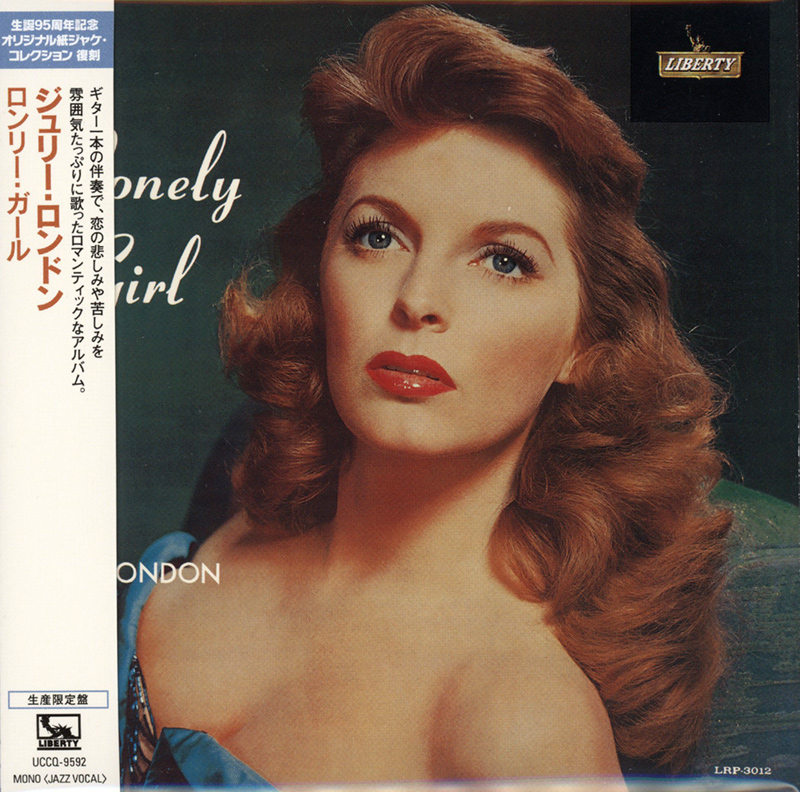Logowanie
OSTATNI taki wybór na świecie
Nancy Wilson, Peggy Lee, Bobby Darin, Julie London, Dinah Washington, Ella Fitzgerald, Lou Rawls
Diamond Voices of the Fifties - vol. 2
Tylko 1000 egzemplarzy!!!
DVORAK, BEETHOVEN, Boris Koutzen, Royal Classic Symphonica
Symfonie nr. 9 / Wellingtons Sieg Op.91
nowa seria: Nature and Music - nagranie w pełni analogowe
Petra Rosa, Eddie C.
Celebrating the art and spirit of music - vol. 3 - Pure
warm sophisticated voice...
Peggy Lee, Doris Day, Julie London, Dinah Shore, Dakota Station
Diamond Voices of the fifthies
Tylko 1000 egzemplarzy!!!
SAMPLER - STS DIGITAL, Buddy Tate, Milt Buckner, Walace Bishop
Jazz Masters - Legendary Jazz Recordings - v. 1
proszę pokazać mi drugą taką płytę na świecie!
Chesky! Niezmiennie perfekcyjny
Winylowy niezbędnik
ClearAudio
Double Matrix Professional - Sonic
najbardziej inteligentna i skuteczna pralka do płyt winylowych wszelkiego typu - całkowicie automatyczna
Julie London
Lonely Girl
- Julie London - vocal
Seria: visual sound STEREO
Reedycja rzeczywiście mistrzowsko zaaranżowanych, wykonanych i nagranych (!) standardów, jakże precyzyjnie opisujących muzyczne gusty melomanów z połowy XX wieku. Piosenka to misterna kompozycja, konkurująca z najbardziej wyrafinowaną myślą inżynierską. Proporcje i relacje między planami, brzmieniem i kolorystyką każdego z instrumentów lub ich sekcji - to wiedza niemal tajemna. Albo usytuowanie głosu wykonawcy w dość intymnej relacji z podkładem. Tak, dokładnie tak - intymnej zależności. Aranżacja - to mistyczna wiedza o smaku i niepowtarzalności oraz wyrafinowaniu odmiennych stylów. Wreszcie dramaturgia każdej z kompozycji - robota wprost jubilerska. Kiedy wybrzmi ostatni akord każdej z tych płyt - pozostaje w nas nie tylko tęsknota i nostalgia. Zapisany zostaje na palecie naszej wrażliwości nowy, często wcześniej nie znany kolor nastroju. A to przecież jest... poezja! Każda z tych kompozycji to opowieść. To historia, której tak chętnie słuchamy. Dzięki tym nagraniom - wracamy do świata... bajki. I tylko na jedno pytanie nie potrafię znaleźć odpowiedzi. Dlaczego i z jakiego powodu ta koronkowa, eteryczna, granicząca z transcendencją wartość estetyczna budowana tą muzyką niemal bezpowrotnie minęła? Niemal, bo u nas, w Clubie CD - jest niezmiennie piękna i żywa. Julie London - w naszej ofercie Lonely Girl Review by Nick Dedina [-] Liberty Records was pleasantly surprised when Julie London's debut album was such a big hit. Julie Is Her Name did contain the hit single "Cry Me a River," but each featured mellow jazz guitar and bass backing -- which was considered commercial suicide in 1955. So, instead of changing direction and recording the follow-up Lonely Girl with a full orchestra, Liberty wisely allowed London to strip the accompaniment down even more on the album by dropping the backing down to one instrument. Lone guitarist Al Viola plays gentle Spanish-tinged acoustic behind the hushed vocalist, and it suits London perfectly. While the singer was often chided for her beauty and lack of range, she deftly navigates these ballads without any rhythmic underpinnings to fall back on. London's intense focus on phrasing and lyrics recalls Chet Baker's equally telescopic approach. So while most of the album contains the usual midnight standards, London sings them in her own way. The title track is the one unfamiliar tune here, and it's a real gem, penned by Bobby Troup (he was London's producer, paramour, and future husband). The low-key Lonely Girl beat the sophomore slump and initially did almost as well in the charts as Julie Is Her Name. Instead of stripping away the guitar in order to make London's next release be the first a cappella torch album, Troup crafted Calendar Girl, a big-budget orchestral affair that was more in keeping with the thematic pop albums released at the time.





























